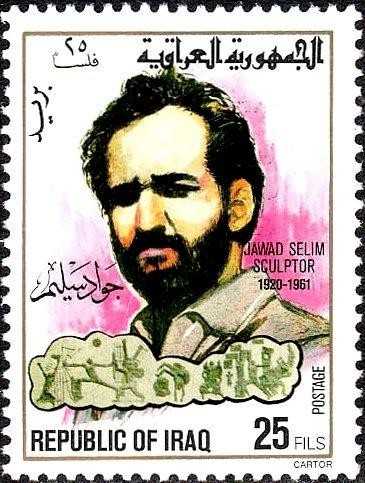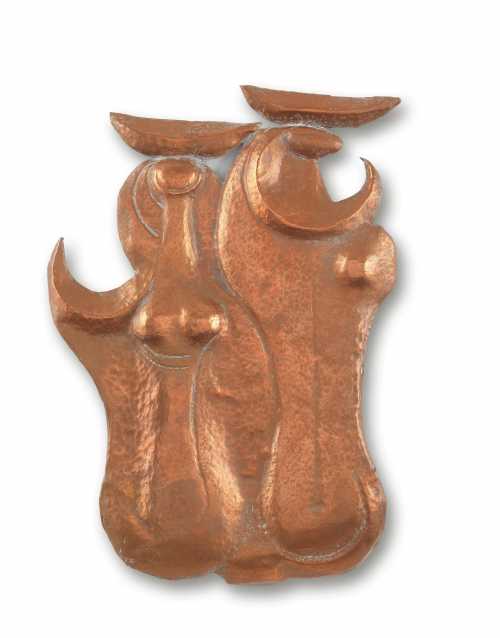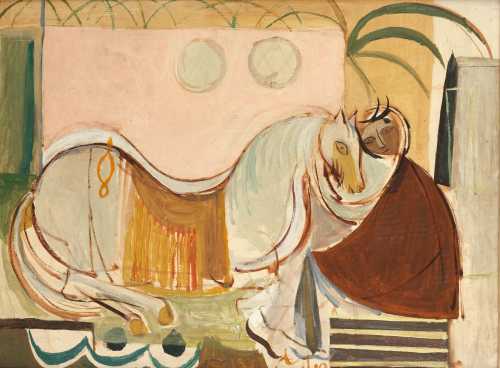- Preparatory sketch for the Freedom Monument, Baghdad 1959
- mixed media on paper
- Painting
- 130 * 30 cm
- Signed and dated "3 March 1959", inscribed "Commemorative relief sculpture for the 14th July", inscribed with note on scale, countersigned by Rifat Chadirji
Framed
Estimation
£15,000
20,967 USD
-
£25,000
34,945 USD
Realized Price
£81,500
113,922 USD
307.5%
Artwork Description
"The revolution and subsequent rise of Abdul Kerim Qassim marked a significant turning point in Iraq's history. A great atmosphere of hope and new beginnings filled the air.
Early in 1959 the new government asked Jewad and the architect Rifat Chadirji to create a monument to celebrate the achievements of the 1958 revolution on its first anniversary. Rifat was to design the wall of the monument and Jewad the figures. Jewad and I had serious discussions about his health and the danger of undertaking such a huge venture. He said that he did not want to spend the rest of his life as an invalid but rarely did an artist get the opportunity to create work on that scale - it was not to be missed.
He completed the maquette in one week and prepared to travel to Italy where he would produce the full-size clay reliefs that would be cast in bronze. At the time there were no facilities in Baghdad to such large-scale work. He had planned to go on his own but then there was serious political unrest in Mosul and he decided to take the children and me with him. We just locked the door and went expecting to stay away for three months but ended up spending a year and a half. What a wonderful time it was!
We spent the first month in Rome, then went to Florence where Jewad rented a studio in the Via degli Artisti to work on the reliefs. Here he produced many of the wonderful preparatory sketches The large, powerful, final series he gave to Rifat Chadriji. Some others are in Baghdad and some in the British museum
The bronze casting was executed in the foundry in Pistoia and Jewad went there to oversee the work. The two-year involvement with the monument exhausted Jewad completely and took the final toll on his health and he never saw his great work in its final position on the wall. he died of a massive heart attack on 23 January 1961, aged only forty one. It was incredible shock for all of us"
- Lorna Selim, the artist's wife
"And you the labourer will make all the beautiful things with your strong hands, for us, and for our children and our inheritors; how magnificent is your will to establish a new civilisation? And how wonderful was Jewad who conveyed this to the world and to the generations to come?"
- Iraqi Broadcast on the occasion of the unveiling of the Monument to Freedom
Jewad Selim culminated his artistic achievements in producing his masterpiece The Monument of Freedom, commemorating the 1958 revolution. This mural, composed of fourteen sculpted reliefs, put the artist under great stress that would ultimately lead to his untimely death in January 1961.
In this monumental work, reminiscent both of ancient Assyrian murals and dynamic art-deco friezes, Jewad weaves together the symbolic figures which makeup the pride and dignity of the Iraqi nation. This extremely important preparatory sketch was most likely executed during the artists excursion to Florence where he was co-ordinating the casting of the panels for the monument
The present sketch, the most complete preparatory drawing of its kind, depicts the major sculptural elements which would make up the eventual monument. Centrally, the political prisoner is freed from jail bars beneath a rising sun, while protestors are depicted on the right fighting for their freedom holding sheaf's of wheat representing their hope of future prosperity, with an emphasis on feminine figures representing the role of Iraqi women in the revolution.
On the left-hand side of the composition two women bearing children represent the Tigris and Euphrates, next to which are bulls, farmers and agricultural labourers, the patriots that will rebuild the brave new Iraq.
On 14 July 1958, a group that identified as the Free Officers, a secret military group led by Brigadier Abd al-Karim Qasim, overthrew the monarchy. This group was markedly Pan-Arab in character. King Faisal II, Prince Abd al-Ilah, and Nuri al-Said were all killed.
The Free Officers were inspired by and modelled after the Egyptian Free Officers who overthrew the Egyptian Monarchy in 1952. They represented all parties and cut across political factions. Qasim was a member of the generation that had launched the revolution in Egypt, and had grown up in an era where radicalism and Pan-Arabism were circulating in schools, including high schools and military academies.
As a group, most of the Free Officers were Sunni Arabs who came from a modern middle class. The Free Officers were inspired by a number of events in the Middle East the decade before 1952. The 1948 War against Israel was an experience that intensified the Egyptian Free Officers' sense of duty. They understood their mission as deposing the corrupt regimes that weakened a unified Arab nation and thrown their countries into distress. The success of the Free Officers in overthrowing the Egyptian monarchy and seizing power in 1952 made Nasser a source of inspiration too.
Showing some stylistic variation from the final monument, the present work nevertheless captures the key motifs of the immense sculpture that would come to be one of the defining landmarks of Modern Iraq.
Early in 1959 the new government asked Jewad and the architect Rifat Chadirji to create a monument to celebrate the achievements of the 1958 revolution on its first anniversary. Rifat was to design the wall of the monument and Jewad the figures. Jewad and I had serious discussions about his health and the danger of undertaking such a huge venture. He said that he did not want to spend the rest of his life as an invalid but rarely did an artist get the opportunity to create work on that scale - it was not to be missed.
He completed the maquette in one week and prepared to travel to Italy where he would produce the full-size clay reliefs that would be cast in bronze. At the time there were no facilities in Baghdad to such large-scale work. He had planned to go on his own but then there was serious political unrest in Mosul and he decided to take the children and me with him. We just locked the door and went expecting to stay away for three months but ended up spending a year and a half. What a wonderful time it was!
We spent the first month in Rome, then went to Florence where Jewad rented a studio in the Via degli Artisti to work on the reliefs. Here he produced many of the wonderful preparatory sketches The large, powerful, final series he gave to Rifat Chadriji. Some others are in Baghdad and some in the British museum
The bronze casting was executed in the foundry in Pistoia and Jewad went there to oversee the work. The two-year involvement with the monument exhausted Jewad completely and took the final toll on his health and he never saw his great work in its final position on the wall. he died of a massive heart attack on 23 January 1961, aged only forty one. It was incredible shock for all of us"
- Lorna Selim, the artist's wife
"And you the labourer will make all the beautiful things with your strong hands, for us, and for our children and our inheritors; how magnificent is your will to establish a new civilisation? And how wonderful was Jewad who conveyed this to the world and to the generations to come?"
- Iraqi Broadcast on the occasion of the unveiling of the Monument to Freedom
Jewad Selim culminated his artistic achievements in producing his masterpiece The Monument of Freedom, commemorating the 1958 revolution. This mural, composed of fourteen sculpted reliefs, put the artist under great stress that would ultimately lead to his untimely death in January 1961.
In this monumental work, reminiscent both of ancient Assyrian murals and dynamic art-deco friezes, Jewad weaves together the symbolic figures which makeup the pride and dignity of the Iraqi nation. This extremely important preparatory sketch was most likely executed during the artists excursion to Florence where he was co-ordinating the casting of the panels for the monument
The present sketch, the most complete preparatory drawing of its kind, depicts the major sculptural elements which would make up the eventual monument. Centrally, the political prisoner is freed from jail bars beneath a rising sun, while protestors are depicted on the right fighting for their freedom holding sheaf's of wheat representing their hope of future prosperity, with an emphasis on feminine figures representing the role of Iraqi women in the revolution.
On the left-hand side of the composition two women bearing children represent the Tigris and Euphrates, next to which are bulls, farmers and agricultural labourers, the patriots that will rebuild the brave new Iraq.
On 14 July 1958, a group that identified as the Free Officers, a secret military group led by Brigadier Abd al-Karim Qasim, overthrew the monarchy. This group was markedly Pan-Arab in character. King Faisal II, Prince Abd al-Ilah, and Nuri al-Said were all killed.
The Free Officers were inspired by and modelled after the Egyptian Free Officers who overthrew the Egyptian Monarchy in 1952. They represented all parties and cut across political factions. Qasim was a member of the generation that had launched the revolution in Egypt, and had grown up in an era where radicalism and Pan-Arabism were circulating in schools, including high schools and military academies.
As a group, most of the Free Officers were Sunni Arabs who came from a modern middle class. The Free Officers were inspired by a number of events in the Middle East the decade before 1952. The 1948 War against Israel was an experience that intensified the Egyptian Free Officers' sense of duty. They understood their mission as deposing the corrupt regimes that weakened a unified Arab nation and thrown their countries into distress. The success of the Free Officers in overthrowing the Egyptian monarchy and seizing power in 1952 made Nasser a source of inspiration too.
Showing some stylistic variation from the final monument, the present work nevertheless captures the key motifs of the immense sculpture that would come to be one of the defining landmarks of Modern Iraq.
More lots by Jawad Saleem

Republic of Iraq Commemorative Stamp
Estimation
£400
559 USD
-
£600
839 USD
Realized Price
£828
1,157 USD
65.6%
Sale Date
Bonhams
-
2 June 2021

The Cream Sellers
Estimation
£15,000
20,675 USD
-
£20,000
27,567 USD
Realized Price
£40,250
55,479 USD
130%
Sale Date
Bonhams
-
17 November 2021

Man and Horse
Estimation
£100,000
137,836 USD
-
£200,000
275,672 USD
Realized Price
£200,250
276,017 USD
33.5%
Sale Date
Bonhams
-
17 November 2021
Realized Price
216,420 USD
Min Estimate
63,161 USD
Max Estimate
108,233 USD
Average Artwork Worth
+120.702%
Average Growth of Artwork Worth
Sales Performance Against Estimates
Average & Median Sold Lot Value
2021 - 2025
Performance vs. Estimate
2021 - 2025
Sell-through Rate
2021 - 2025
